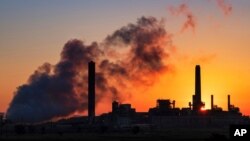Climate scientists warn the world is courting disaster if it fails to swiftly do what’s required to limit global warming to 1.5 degrees Celsius.
The Intergovernmental Panel on Climate Change released a report on mitigating climate change. After two previous reports on the physical science behind climate change and on its potential impacts, the United Nation’s top climate body says changes are now causing huge disruptions in the natural world and in human well-being.
Over the last decade, the report says average annual global greenhouse gas emissions were at their highest levels in human history.
However, the co-chair of the panel’s third working group, Jim Skea, says the rate of growth has slowed in the last two years along with increasing evidence of many countries taking climate action.
“Despite this progress, our assessment concludes that unless there are immediate and deep emission reductions across all sectors, limiting warming to 1.5 degrees will be beyond reach," he said. “Now limiting warming to around two degrees still requires global emissions to peak before 2025 at the latest, and be reduced by a quarter by 2030.”
The report says the energy sector accounts for a third of all emissions, and major transitions will be required to slow global warming. This, it says, will involve substantial reductions in fossil fuel use, widespread electrification, improved energy efficiency, and the use of alternative fuels.
The vice-chair of the third working group, Diana Urge-Vorsatz, says the right policies can result in a 40 to 70 percent reduction in greenhouse gas emissions by 2050. She says changes in lifestyle and behavior also can reduce the carbon footprint, as well as improve health and well-being.
“Of the 60 actions we assessed in this report, on an individual level, the biggest contribution comes from switching to walking and cycling and using electrified transport. Other effective options include reducing air travel and adapting our houses,” Urge-Vorsatz said.
Scientists on the intergovernmental panel agree business as usual is not an option in meeting the many challenges of climate change. They warn the longer action is put off, the more irreversible it will become.





